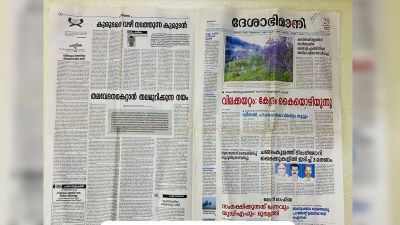NRIs get more concessions
MUMBAI, June 1: The finance minister has offered a number of sops to the non-resident Indian NRI community encouraging them to invest in t...

MUMBAI, June 1: The finance minister has offered a number of sops to the non-resident Indian NRI community encouraging them to invest in their homeland as a counter-move against the sanctions imposed by the western powers and the slow down in the the flow of foreign exchange into the country. This is seen as a move to dilute the impact of sanctions which is estimated to affect inflow of foreign echange into the country.
quot;Whenever I have travelled outside India, NRIs have expressed a sincere desire to contribute meaningfully to the development of India. I believe NRIs constitute a huge, untapped potential for India8217;s development,quot; said Sinha during his budget speech.
NRIs, a major lobby supporting the BJP, have been offered a Resurgent India Bond and several other new initiatives to enhance their contribution in the development of Indian economy. More NRI fund is sought to revive the sagging stock market and to direct fresh NRI investments to the economy to supplement the foreign institutional investorswho have been deserting the Indian market after the nuclear explosion.
The experience of the South-east Asian countries too might have prompted the finance minister to tap the NRI bonanza. It is expected that some of the leading NRI businessmen like the Hinduja group, Swaraj Paul and other wealthy Indians may accept the new role assigned to them. FM has also announced his plans to double the flow of foreign direct investment within two years.
Sinha raised the individual investment limit of one per cent for NRIs to 5 per cent and the aggregate limit for all NRIs investments in a company from five per cent to 10 per cent. Currently NRIs are allowed to purchase shares in Indian companies in the secondary market subject to a limit of one per cent of the company8217;s total equity for individual NRIs and overseas corporate bodies OCBs, with a 5 per cent limit for aggregate NRI/OCB investments in the company.
These limits were imposed many years ago when the capital market regulations were much weaker and therewere no rules governing acquisition and takeovers. The situation has changed materially in both these respects. The concessions to NRIs and OCBs will enhance the shareholding of foreign capital in many Indian companies.
Presenting the 1998-99 budget, the FM said the Unit Trust of India UTI would launch India Millennium Scheme to attract NRI savings. The money colllected under the UTI8217;s proposed India Millennium Scheme would be invested in shares of Indian companies with high potential for growth and in high quality Indian debt.
The details of the scheme would be announced shortly. However, the fluctuations in the exchange rate may deter NRIs from investing in the scheme as the capital gain through these investments can be offset by the fluctuations in the exchange rate.
The intention of the FM to attract NRI funds into the Indian stock exchanges and the real sectors of the economy can be effective only if they are convinced about the stability of the Indian rupee and that the exchange ratefluctuations will not offset the potential gains made by their investment in the Indian stock and debt market.
Currently, many NRIs prefer to keep their hard earned savings in hard currency and repatriate only selectively. Large scale flow of NRI funds can also add more fluctuations in the stock and forex markets, similar to the FII investments. Even though the investments are in dollar denominated instruments like the UTI8217;s resurgent India fund, the exchange rate risk is high.
quot;NRIs have also complained to me that the procedures governing their participation in our share markets are extremely cumbersome and onerous,quot; said Sinha adding that these procedures will be thoroughly reviewed with a view to modifying them to facilitate investment by NRIs in Indian market.
State Bank of India will also launch a new Resurgent India Bond denominated in foreig currencies for subscription by NRIs. The bond will be fully repatriable and the government will extent tax concessions similar to those currently availableto NRI deposits.
In line with BJP8217;s agenda for dual citizenship to NRIs, Sinha has also announced a scheme for issuance of a Persons of Indian Origin PIO card for those living abroad and having foreign passports. The PIO card would besides introducing a visa-free regime, will also confer some special economic, educational, financial and cultural benefits. This card would be issued to the persons of Indian origin settled in countries to be specified by the government later. Sinha said that the details were being worked out.
He also announced that the government would review the procedures governing NRI participation in country8217;s share market to make it less cumbersome and onerous to facilitate investment by NRIs. The baggage allowance for the NRIs returning home has also been enhanced from Rs 6000 to Rs 12000.
- 01
- 02
- 03
- 04
- 05































